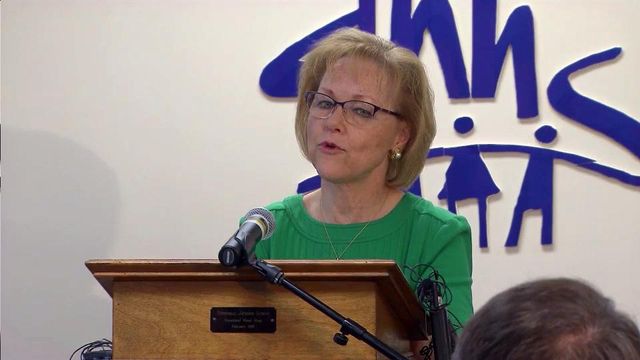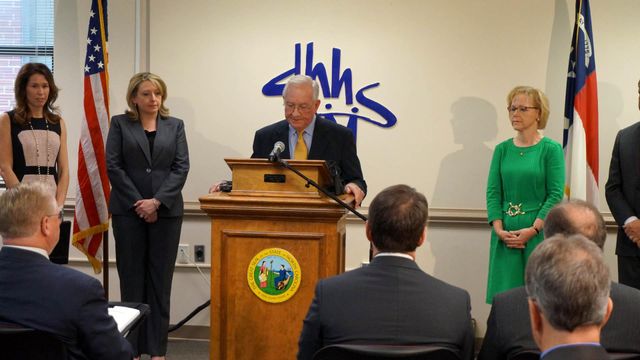NC health agency rolls out Medicaid overhaul plan
North Carolina health officials said Monday that their long-awaited proposal to overhaul how Medicaid operates in North Carolina is "realistic" and "achievable" and will make state budgets more predictable.
Posted — UpdatedNow, Gov. Pat McCrory's administration must convince enough legislators to agree within the next few months to get the General Assembly to approve the core of the reform proposal. While several physician and hospital organizations praised the plan forwarded to legislative leaders by Monday's deadline, one key senator and plan adviser already has criticized it as falling short on the aims of reform.
Department of Health and Human Services Secretary Dr. Aldona Wos said the process was far from over to find consensus. The legislature is expected to consider the overhaul when it reconvenes in May.
"Some will want a more aggressive plan, and some will say that this plan is too much, too fast," Wos said at a news conference releasing the plan. "But we all know that Medicaid reform must happen. We cannot wait another year to start such an important system."
Wos' department provided more details to a framework discussed publicly a few weeks ago before a five-member advisory board created in last summer's state budget to help formulate a proposal.
The effort focuses on creating networks of primary care physicians or hospitals that would have financial incentives to keep Medicaid costs below set levels but would also share in cost overruns. The so-called "accountable care organizations" are predicted to create most of the cost savings in the proposal for Medicaid, the combined federal-state health coverage program for 1.8 million North Carolina residents, who are mostly poor children, older adults and the disabled.
Overall, the reform effort would begin in July 2015 and slowly create savings that reach $329 million annually by mid-2020, one-third of which would be earmarked for the state. The total accumulated savings over five years could reach close to $1 billion. For a program that spends $13.5 billion annually in federal and state funds, the predicted savings would be 2 to 3 percent, Wos said.
"This is significant for the taxpayers," she said.
The advisory board, which had public meetings, didn't vote on the recommendations but provided their own comments in the final report. Four of the five members, including Rep. Nelson Dollar, R-Wake, generally supported the recommendations, but Sen. Louis Pate, R-Wayne, didn't.
Pate wrote in a letter to Wos that the proposal doesn't meet the legislature's goals of creating provider administrative efficiencies, treating physical and behavioral help in unison and stabilizing costs.
"In its current form, the proposal does not completely achieve any of these objectives," he wrote. "Instead of providing a comprehensive plan, the proposal presents a list of tentative steps that may move us in a new direction, but collectively fall short of the vision and goals of true reform this group was tasked with developing."
Pate said the proposed plan still would require the state to spend an additional $840 million on Medicaid over the first five years, citing analysis by the legislature's nonpartisan staff. The legislature has been struggling for years with getting a handle on Medicaid cost overruns. McCrory said $500 million in unplanned Medicaid spending last year and this year siphoned away money for teacher and state employee pay raises.
Wos and McCrory initially pushed last year the idea of the state contracting with a handful of managed-care providers and give them a fixed amount for every patient they served to deliver care. The changes may have resulted in more cost savings, but the state's medical community strongly opposed the idea of what many labeled Medicaid privatization.
The current fee-for-service plan, in which doctors and hospitals are reimbursed by Medicaid for each additional procedure they perform, is unsustainable, said Hugh Tilson, executive vice president of the North Carolina Hospital Association, which endorsed the proposal. The accountable care organizations also would have to meet or exceed quality standards to minimize losses and maximize incentives.
"We know we have to move from a volume-based system to a value-based system," Tilson told reporters. "We have to change the way that care is provided and is paid for, to really do what's right for the patient."
It wasn't clear whether other Senate Republicans shared Pate's concerns. The office of Senate leader Phil Berger, R-Rockingham, didn't provide Monday any response he had to the report.
House Speaker Thom Tillis, R-Mecklenburg, said in a release that legislators and McCrory's administration "all share the same goals for Medicaid: to improve access, lower costs and improve health care outcomes in North Carolina. I'm confident we will achieve all three where others have failed to do so."
Federal authorities also would have to approve the proposal before it could take effect.
• Credits
Copyright 2024 by WRAL.com and the Associated Press. All rights reserved. This material may not be published, broadcast, rewritten or redistributed.






